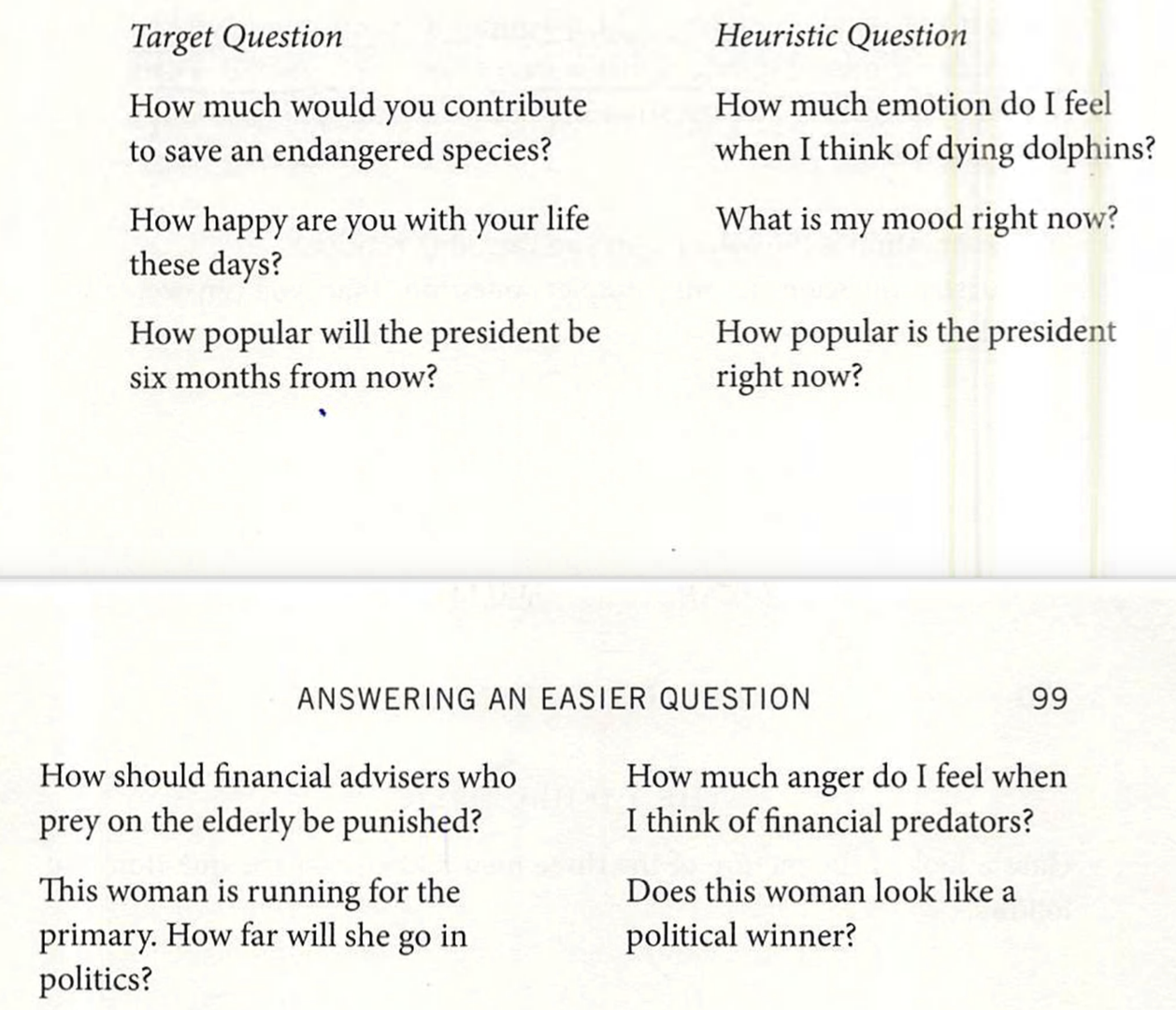Substitution as a Lazy Narrative-Preserving Technique (Using Gays Against Groomers as an Example)
What are the policy positions of Gays Against Groomers? Many people won’t know because corporate media on the left (I checked the NYT and WaPo) refuse to mention the organization. I recently asked someone who considers herself to be on the political left. She cringed and responded by saying that it sounds like a Republican or conservative group and that there is no grooming going on in America’s schools.
That seems like an answer to the question, but it isn’t. What just happened is subtle, but it is critically important. The person I was talking to completely failed to answer my question. Her answer illustrates Daniel Kahneman’s principle of “substitution,” which he discussed at length in Thinking, Fast and Slow (2011).
[W]hen faced with a difficult question, we often answer an easier one instead, usually without noticing the substitution.
(p. 12).
In my experience, this is a go-to technique in the culture war conversations. Quite often, when people are asked factual questions about a person or organization they don’t like (or they assume they don’t like), they will substitute an easy question for the more difficult question of detailing the facts. The substituted easy question will often be something like “Do you like this person/organization,” even though that was clearly not the question asked. As Kahneman describes, the new simple question will be unconsciously inserted. With the new simple question substituted in, the answer is also simple. In culture war discussions, it often takes the form of an ad hominem attack. Consider this example:
Q: “What are the policy position of [a particular person/group]?”
This is a factual question that should either be “I don’t know” or it should be a listing of the policy positions of the person/group. If the is about an organization and the answer is anything other than “I don’t know,” it should fairly track the “About Us” page of the website the person or organization.
However, the hard question is often unconsciously brushed to the side and a new easy question is inserted. In my example, if the person thinks they don’t like the person or organization, they could be expected to substitute in a new simple question like this:
“Do you like [the person or group] and what detrimental things can your emotionally generate (e.g., what deplorable person/affiliation/ad hominem label can you reflexively pull out) to express your emotions?”
For people politically on the Left, the answer will often be something like: “That [person/group] is like Hitler, Republicans, Satan, etc.
On this topic of Substitution, here is another excerpt from Kahneman book (p. 101):
The idea of substitution came up early in my work with Amos [Tversky], and it was the core of what became the heuristics and biases approach. We asked ourselves how people manage to make judgments of probability without knowing precisely what probability is. We concluded that people must somehow simplify that impossible task, and we set out to find how they do it. Our answer was that when called upon to judge probability, people actually judge something else and believe they have judged probability. System 1 often makes this move when faced with difficult target questions, if the an¬swer to a related and easier heuristic question comes readily to mind.Consider the questions listed in the left-hand column of Table 1.

These are difficult questions, and before you can produce a reasoned answer to any of them you must deal with other difficult issues. What is the meaning of happiness? What are the likely political developments in the next six months? What are the standard sentences for other financial crimes? How strong is the competition that the candidate faces? What other environmental or other causes should be considered? Dealing with these questions seriously is completely impractical. But you are not limited to perfectly reasoned answers to questions. There is a heuristic alternative to careful reasoning, which sometimes works fairly well and sometimes leads to serious errors.[More . . . ]
About Countries that Irreversibly Lose Their Way
I increasingly think of Chesterson's Fence:
Chesterton's Fence is a principle that says change should not be made until the reasoning behind the current state of affairs is understood. It says the rash move, upon coming across a fence, would be to tear it down without understanding why it was put up.
Peter McCullough, M.D. was censored during COVID and he has since been proven correct on many of his positions. Yet he didn't become bitter (at least that I could see in public). Rather, he keep trying to communicate where we, as a society, have lost our way. McCullough keeps trying to shed light on the problems he detects, but I detect an ominous undertone in his writings, a sense that we are sustaining too much damage as a society and that we might no longer have the tools, as a society, to repair the damage. I increasingly detect that same feelings in myself. In a recent article, McCullough writes:
Once the belief in a country and institution has been lost, it is very difficult to rejuvenate it. This is the principle reason why most conservative commentators often come off as sounding staid and uninspiring to the young. It’s as though the spirit has departed from the body that no amount of edifying rhetoric can reanimate. As Hegel pointed out in the preface to his Elements of the Philosophy of Law:That feeling that we might have crossed the event horizon has increasingly been expressed by people who inspire me, including (now deceased) George Carlin and Jonathan Haidt.Philosophy always arrives too late to teach the world how it should be. As the thought of the world, philosophy appears only in the period after reality has been achieved and has completed its formative process. This lesson, also taught by history, is that only in the late stage of reality does the ideal appear in opposition to this reality, grasping it in the form of an intellectual construct.
When philosophy paints its gray in gray, then a form of life has grown old, and cannot be rejuvenated, but only recognized; the Owl of Minerva takes flight only as the dusk begins to fall.
Excerpt from The Australian --
"'I am now very pessimistic,' Haidt said. 'I think there is a very good chance American democracy will fail, that in the next 30 years we will have a catastrophic failure of our democracy.'"
We might have fucked things up too much to ever fix them. George Carlin gets the last word here.:
The Transgender Intersex Gambit: “But Intersex People Exist!”
There are only two biological sexes because there are only two types of gametes. Yes, some people are difficult to categorize by simply looking at their bodies, but if they produce a gamete (a cell capable of combining with another cell to produce a human being), it will be either an egg or a sperm, not a spegg nor any other functional option. See this short video produced by the Paradox Institute.
Almost inevitably, upon taking this position, you will hear people who have inhaled gender ideology say the "But intersex people exist." Intersex conditions exist, but they are rare (2/10,000), much rarer than the (approximately 1.4/100) of 13-17 year old teenagers now claiming to be transgender. Consider the following chart, which illustrates the number of intersex people compared to the numbers of people whose sex is obvious by simply looking:
How does the Intersex Gambit unfold? You will be challenged with the following, which I've heard in person several times from people formally educated enough to know better than to screw up something everyone learned in high school biology. They will say something like this: "Sex is not binary because intersex people exist and this demonstrates that biological sex is a spectrum." Biologist Colin Wright, author of "Understanding the Sex Binary," elaborates. Gender ideologists advises:
If no single line can be drawn, then anywhere someone chooses to draw one is totally arbitrary and subjective. If it’s totally arbitrary and subjective, then that means the categories male and female are also arbitrary and subjective “social constructs” with no firm root in biological reality. If that’s the case, why are we categorizing people in law according to these arbitrary labels instead of letting people simply label themselves? To do otherwise is to oppress people based on a biological falsehood.
Wright laments that this argument is made with "stunning success" and that it has even been embraced by "parts of the scientific establishment and the medical profession." Those using this argument include historian of science Alice Dreger.
In her book, Hermaphrodites and the Medical Invention of Sex, Dreger refers to intersex individuals as “hermaphrodites,” and says: “Hermaphroditism causes a great deal of confusion, more than one might at first appreciate, because—as we will see again and again—the discovery of a ‘hermaphroditic’ body raises doubts not just about the particular body in question, but about all bodies. The questioned body forces us to ask what exactly it is—if anything—that makes the rest of us unquestionable.”
Anecdotes Get Headlines. Data? Not so Much.
Steven Pinker was asked to name one thing wrong with the world that he would change. His answer (excerpt):
Too many leaders and influencers, including politicians, journalists, intellectuals, and academics, surrender to the cognitive bias of assessing the world through anecdotes and images rather than data and facts.
Our president assumed office with a dystopian vision of American “carnage” in an era in which violent crime rates were close to historical lows. His Republican predecessor created a massive new federal department and launched two destructive wars to protect Americans against a hazard, terrorism, that most years kills fewer people than bee stings and lightning strikes. In the year after the 9/11 attacks, 1,500 Americans who were scared away from flying perished in car crashes, unaware that a Boston-LA air trip has the same risk as driving 12 miles.
One death from a self-driving Tesla makes worldwide headlines, but the 1.25 million deaths each year from human-driven vehicles don’t. Small children are traumatized by school drills that teach them how to hide from rampage shooters, who have an infinitesimal chance of killing them compared with car crashes, drownings, or, for that matter, non-rampage killers, who slay the equivalent of a Sandy Hook and a half every day. Several heavily publicized police shootings have persuaded activists that minorities are in mortal danger from racist cops, whereas three analyses (two by Harvard faculty, Sendhil Mullainathan and Roland Fryer) have shown no racial bias in police shootings...
People are terrified of nuclear power (the most scalable form of carbon-free energy) because of images of Three Mile Island (which killed no one), Fukushima (which killed no one; the deaths were caused by the tsunami and a panicked, unnecessary evacuation), and Chernobyl (which killed fewer people than are killed by coal every day).


